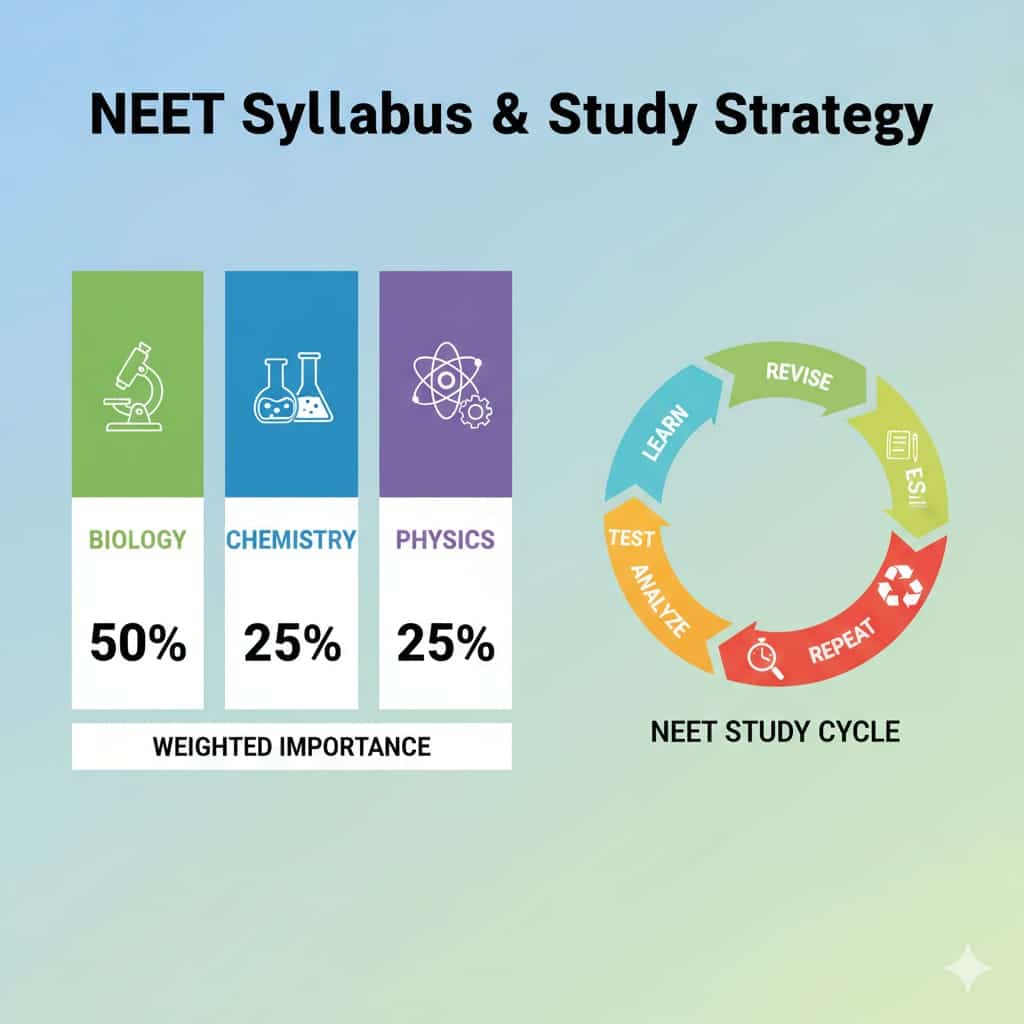The National Eligibility cum Entrance Test (NEET) is not merely a test for every medical aspirant in India, but the key to achieving his or her dream of becoming a doctor. NEET is among the competitive examinations in the country, with more than 20 lakh candidates showing up annually. To be successful, one has to work hard, but it takes a good plan, good study materials, and exercise.
In case you are planning NEET, the guide will assist you in knowing what to learn, what not to learn, and how platforms such as the Digital Library and LMS offered by Mintbook can provide you with the winning hand.
1. Understanding the NEET Syllabus: The First Step to Smart Preparation
It is important to understand what one should study before going through books or mock tests. Syllabus NEET is enormous yet clear, and it is mainly grounded on the NCERT curriculum of Classes 11 and 12. The way to address each of these subjects is as follows:
Physics: Concept Over Memorization
Physics can be seen as a thorn in the flesh of NEET aspirants due to its numerical and conceptual characteristics. Mechanics, Electrodynamics, Thermodynamics, and Modern Physics are some of the topics with heavy weightage.
Be conscious of the creation of conceptual clarity rather than being formulaic. Once you understand the logic behind equations, solving numerical problems becomes easier.
Chemistry: The Scoring Subject
Chemistry is a mix of memory and logic. It’s divided into three parts: Physical chemistry- Practice problems with numbers daily.
Organic Chemistry- Learn reaction mechanisms and functional groups.
Inorganic Chemistry – Rely on NCERT line-by-line reading for definitions and exceptions.
Students often overlook NCERT examples and exercises — yet nearly 80% of NEET Chemistry questions come directly from them.
Biology: The Game Changer
Biology is 50 percent of the NEET question paper and thus the most important subject. Give a lot of attention to the NCERT textbooks of Biology because most of the questions are direct or slightly distorted on the basis of these.

Of particular interest are the Human Physiology, Plant Physiology, Genetics, Ecology, and Biotechnology. Develop visual summaries by flowcharts and diagrams to revise within a short time..
2. Common mistakes NEET Aspirants make
The most committed candidates may crumble when they become victims of some pitfalls in preparation. Eschewing them saves precious marks.
- Disregarding NCERT: NCERT is full of books that are sought out by many students, and NCERT should be your backbone and additional books are meant to complement rather than substitute NCERT.
- Missing Mock Tests: It is impossible to have real-time performance without doing routine tests on your preparation.
- Not doing the Revision: The NEET syllabus is massive, and without regular revision, the knowledge is forgotten soon.
- The problem of studying without a Plan: Random study sessions usually result in burnout. A systemic study program is absolutely necessary.
- Time Management: The Time management of many students is poor, as they spend too much time in other weaker sections, which may not be very important in the weightage. Balance is key.
- Failing to Review Mistakes: The only good thing about mock tests is that you should study your mistakes and learn.
By avoiding such errors, you will be able to keep up and make consistent progress towards your goal.
3. Study Techniques That Work: The Proven Path to NEET Success
NEET isn’t about studying more; it’s about studying right. Here are the methods toppers swear by:
Master the NCERT Books
NCERT is the bible for NEET. Every line, diagram, and example can appear in the exam. Make concise notes while studying and highlight tricky concepts. Go through the NCERT books several times until you can remember concepts without any effort.
Pursue a Strategic Revision Cycle.
Create a 3-step revision plan:
Phase 1: Weekly assessment of all the topics discussed during the week. Phase 2: Monthly consolidation, paying attention to weak points.
Phase 3: Last revision before examinations, in which you are only concerned with formulas, diagrams and key questions.
Revision can be enhanced with the help of digital flashcards and summary notes to make it faster.
Take Regular Mock Tests
Simulating the actual NEET environment is crucial. Do full-length mock tests at least once a week and assess your work. Monitor the accuracy, speed, and topic-related scores.
Pomodoro Studying Technique.
Divide your study periods into 2530-minute intensive study periods and 5-minute pauses. This enhances focus and eliminates burnout.
Join Peer Study Groups
Collaborative learning occurs with the help of group discussions and quizzes. When you teach fellow students a subject that you have mastered, it also strengthens your knowledge.
4. The Role of a Digital Library in NEET Preparation
In today’s tech-driven education landscape, digital libraries have become an indispensable part of NEET preparation. Platforms like Mintbook’s Digital Library provide 24/7 access to thousands of e-books, study notes, diagrams, and previous-year question papers — all in one place.
This is the way it can benefit NEET aspirants:
- Unlimited Access 24/7: There is no need to bring bulky Work wherever you are, on your laptop, tablet or phone.
- E-books and Study Notes: Receive material that is curated by the best teachers (NCERT-based explanations and high-level practice sets).
- Interactive Diagrams: High-quality and labeled visuals and 3D diagrams simplify the understanding of Biology concepts.
- Quick Search and Highlights: Spend less time searching by quickly finding and highlighting key information to review.
- Eco-Friendly and Affordable: One subscription will allow access to a variety of resources without spending money on expensive textbooks.
The Digital Library provided by Mintbook can be a part of your habit, which guarantees your uninterrupted access to quality, well-organized, and exam-related information.
5. How a Learning Management System (LMS) Elevates NEET Prep
An LMS (Learning Management System) like Mintbook’s doesn’t just provide content — it personalizes your entire learning journey.
The following is the way the LMS by Mintbook changes NEET preparation:
- Practice Quizzes and Mock Tests: Daily quizzes and topic-based tests are used to strengthen what you study and define what you lack knowledge about.
- Performance Analytics: See your performance in real time, your accuracy, speed, and areas of weakness, and optimize your study plans.
- Adaptive Learning: The machine will adjust the difficulty of the questions according to your progress, which means that you will have a personalized learning process.
- Progress Tracking: Visual charts demonstrate the way you are improving over time, which keeps the motivation high.
- Gamified Learning: Badges, Challenges, Leaderboards: Study fun and with

Having these kinds of intelligent features, the LMS offered by Mintbook makes the process of learning information-oriented, systematic, and much more efficient than conventional self-study.
Conclusion: Prepare to have the Mintbook Advantage in Your NEET Life.
To succeed in NEET, one has to study smarter instead of studying harder. The NEET aspirants can use Mintbook Digital Library and LMS, which offer a comprehensive preparation strategy: NEET-focused study material, interactive learning, and progress tracking. This aid assists in NCERT revision, test mock, and analysis and growth of the students, keeping them on top of things.
That being the case, in case you want to crack NEET and feel confident, then it is time to take the Mintbook challenge, your online companion to smarter, stronger, and more successful NEET preparation.

